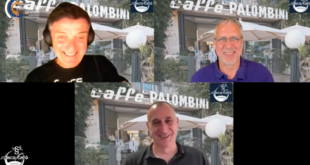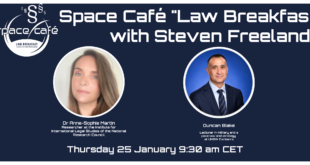by Dr. Olga Stelmakh-Drescher and Prof. Steven Freeland
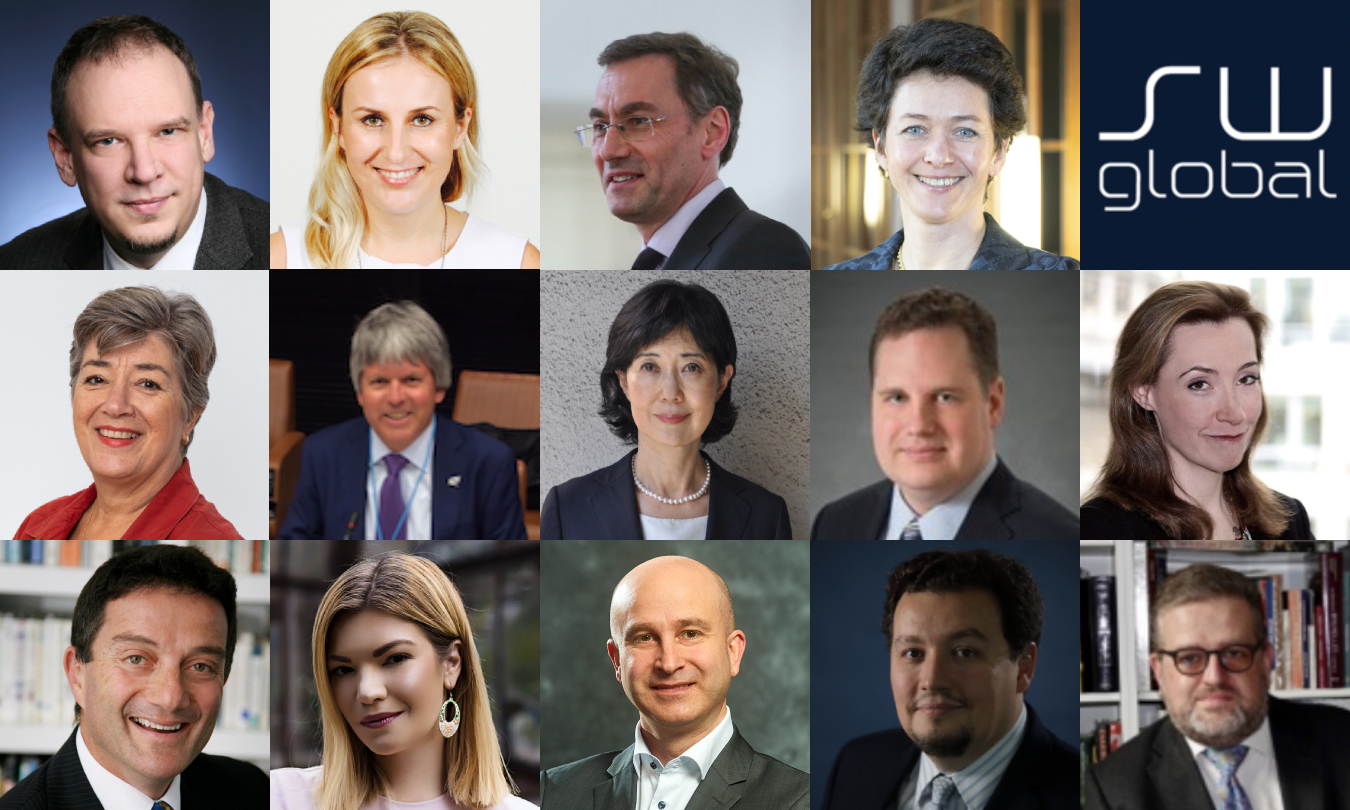
Space is becoming increasingly congested. The European Space Agency (ESA) has estimated that there are currently 128 million pieces of debris smaller than 1cm, about 900,000 pieces of debris 1–10cm in length, and around 34,000 pieces larger than 10cm in Earth orbit. This is in addition to the approximately 3,300 currently operational satellites.
Given the high orbital velocity of objects in space, any collision – between two or more space objects – could generate thousands more pieces of debris. These could cause more collisions, potentially triggering a cascading and exponential increase in debris called the ‘Kessler effect’, to the point that we might eventually see a “debris belt” around Earth, making the space environment less sustainable, accessible and safe for conducting space operations.
The emergence of large constellations of small satellites, whilst offering great benefits, adds further to the complexity of safe, predictable and responsible traffic behaviours in space. We need to develop an effective mechanism to manage the way they will alter the paradigm of space as we know it. After all, if the well-publicised plans of just a few large corporations come to fruition, the number of objects launched into space over the coming years will dwarf the number thus far launched since the 1957 Sputnik 1 mission by a factor of up to 10 times.
Collisions between objects in orbit are therefore becoming harder to avoid. More satellites in space heightens the potential risks of unacceptable conjunctions and even collisions. In recent times, we have seen several near misses in space. In 2019, ESA sent one of its Earth-observing satellites on a small detour to avoid a high possibility of a collision with one of SpaceX’s Starlink satellites. In late January 2020, we all watched helplessly as two large ‘dead’ satellites – IRAS and GGSE-4 – passed within metres of each other. NASA often manoeuvres the International Space Station when it calculates a higher-than-normal risk of collision with debris.
Yet, any collision/conjunction avoidance measures that are taken to address these increasingly regular challenges are largely undertaken on an ad hoc basis. There are no comprehensive and widely accepted standard practices to coordinate, manage and control “space traffic”, unlike the situation that has been developed for air traffic. There is not even a simple public “phone directory” of relevant contact personnel within space operators who should be contacted in the event of an unacceptably high risk of collision. This is becoming an unsustainable position – in short, simply maintaining this uncoordinated “business as usual” approach threatens the very future of humankind’s relationship with space.
Instead, what is required is a globally coordinated space traffic management system to avoid collisions that would result in the loss of control of satellites, leaving them to tumble helplessly in orbit or fall back to Earth. Given the complexities involved, this should cover all phases of space activities – launch, in-orbit operation, post mission and (uncontrolled) re-entry. In this regard, intersectoral coordination amongst the space, air and sea sectors will be necessary.
This is not without significant technological, legal, geopolitical and cultural challenges. Comprehensively tracking every satellite’s movement and functionality is even harder than it sounds, given that we don’t (yet) have the capability to locate and track items in space smaller than about 10cm. The international legal and policy framework, although encompassing important principles and debris mitigation and space sustainability guidelines, does not comprehensively address the imperatives.
Perhaps the most difficult challenge is that an effective space traffic management system would inevitably require global engagement by all space actors, including all countries’ willingness to act transparently and share information they often regard as confidential matters of national security. Ultimately, however, global cooperation is essential if we are to avoid an unsustainable future for our space activities.
With this in mind, Prof. Steven Freeland and Dr. Olga Stelmakh-Drescher, in partnership with SpaceWatch.Global, launched this Space Traffic Management (STM) study to highlight various global perspectives and key trends related to STM and to foster constructive discussions of appropriate future practical courses of action in addressing the most challenging, but also the most promising matter-related facets. For this purpose, we approached twelve leading global experts, opinion- and decision-makers, influencers and advocates known for their active engagement in STM, representing a diverse range of core stakeholders. They have been asked to share their personal views regarding the most impactful STM trends and thus further highlight the need for even greater attention to be focused on the issue.
This is the second such study prepared by the authors as part of the SpaceWatch.Global (SWGL) trend studies series, which focuses on the important and distinctive critical issues impacting on the space activities ecosystem. The first of these studies, which focused on the issue of Space Sustainability, can be accessed at the SWGL Platform.
We hope this latest study will encourage additional impact-driven conversations, promote the furtherance of multilateral dialogues and bring us a step closer to the development of a “ready to implement” STM operational mechanism.
If you have comments or queries regarding any of these studies to date, or suggestions for future studies, please do not hesitate to contact the authors at: [email protected] and [email protected], or leave comments under this post on SpaceWatch.Global social media.
Dr. Holger Krag, Head of the Space Safety Programme, European Space Agency (ESA), Germany
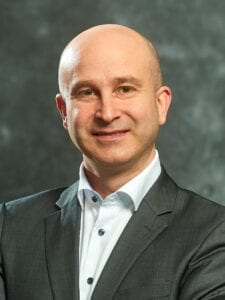
Managing space traffic has two important facets: Firstly, space operators are facing an increased amount of conjunction alerts with other active satellites, while schemes, protocols for automated coordination are completely lacking today. Secondly, we will start to see limits of the environment carrying capacity. We need to consider space as a limited resource (similar to the limited frequency spectrum), which needs to be used more efficiently. The fastest way to achieve this is to let technology advance through the industrial and public sector and develop, demonstrate and deploy the improved means for coordination, mitigation and high precision tracking. Experience shows that the technical means need to be in place before regulatory action can be successful.
Dr. Natalia Archinard, Deputy Head of Science, Transport and Space Section, Federal Department of Foreign Affairs, Switzerland
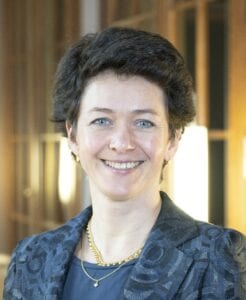
While the private sector is launching increased numbers of satellites into low Earth orbits, it is developing new types of services, like on-orbit servicing, active debris removal, space situational awareness and conjunction assessment capacities. Commercial operators get organised for exchanging data and coordinating collision avoidance operations. Such initiatives could inspire States while they negotiate new rules and standards for space traffic management at international level. To my view, any efficient international space traffic management regime would need to be broadly supported, and hence developed in a truly inclusive manner at global level.
Mr. Olivier Lemaitre, Secretary General, ASD-Eurospace, Europe
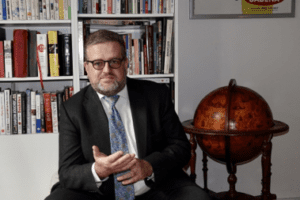
Earth orbits are the places where the space industry is actually delivering its products. If the orbits aren’t safe anymore, the business will be compromised. It is therefore key to safeguard the capability and freedom to operate safely in increasingly congested Earth orbits. Industry considers that an EU-led approach to Space Traffic Management is key to safeguard the autonomy of Europe, the sustainability of its space sector and to support the emergence of service markets accessible to European operators. Furthermore, an EU-led multilateral approach to STM is likely to receive more support from the worldwide community than a one led unilaterally.
Prof. Dr. Kai-Uwe Schrogl, German EU Council Presidency team, Germany
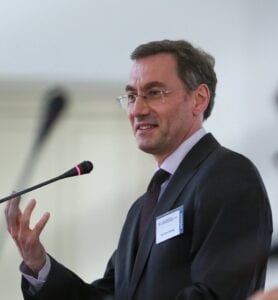
2021 is the year, Europe sets its position on STM. Launched by the EU-ESA Space Council in November 2020, EU, ESA and their Member States are heading for a European STM Conference this July. Germany initiated this position-building during its past EU Council Presidency and now facilitates the preparation of the Conference. It shall lead to a joint European understanding of the relevance of STM, the necessary activities in the technological as well as regulatory areas and the respective inputs and roles by the relevant actors. This is also intended to contribute to a multilateral effort in shaping an international approach to STM.
Dr. Agnieszka Lukaszczyk, Senior Director – European Affairs, Planet, Belgium

Last 12 months have proven that space technology, remote sensing in particular, is not only useful but essential during the time of crisis. It goes without saying that in order to benefit from these technologies we need to make sure that they can safely operate in space. STM is no longer an option but a necessity to accommodate the current and the new actors. LEO and GEO are getting crowded, mega constellations are here to stay; thus, the set of technical and regulatory provisions for promoting safe access into outer space, operations in outer space and return from outer space should be a priority on a global level. A multilateral approach to STM will be of essence.
Dr. Brian Weeden, Director of Program Planning, Secure World Foundation, USA
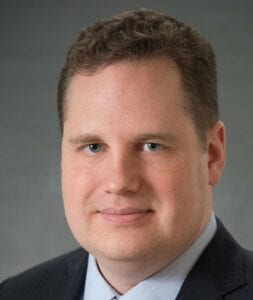
A trend I have noticed in the last year is a renewed debate about how to define STM that seems to be slowing down progress on actually implementing STM. For example, in December 2020, several European countries voted against starting a new work item within ISO on “Space Traffic Coordination and Management” in large part because they did not agree with the definitions. And over the last few months several new studies have been launched whose goals (at least in part) are to “define” STM. There have been many studies over the last 15 years (or more) that have attempted to create authoritative definitions for STM that all came to largely similar conclusions but not consensus.
Prof. Dr. Setsuko Aoki, Professor of Law, Keio University Law School, Japan
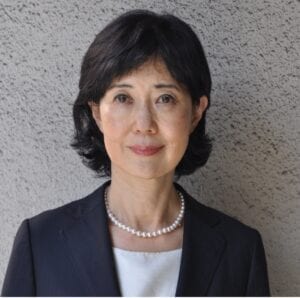
In 2020, Rocket Lab launched its rocket six time from its own launch site located in New Zealand. This outnumbers four times by Japan and twice by India. This is only one example. The truly blossoming private space sectors only demonstrate that STM rules applicable to all actors are urgently needed. Rules have multiple aspects and industry-led technical standards seem to be one effective idea as making international rules needs time even if these are non-legally binding. However, international guidelines should also be pursued with developing industry-led standards for the eventual effectiveness.
Mr. Alexandre Vallet, Chief, Space Services Department, Radiocommunication Bureau, International Telecommunication Union, Switzerland

Space Traffic Management (STM) activities need to be developed in the framework of the existing international space law. For example, use of radiofrequencies in support of STM activities needs to be compliant with the ITU Radio Regulations, the international treaty governing the use of the radio spectrum and associated orbits. Internationally-agreed standards which contain enough technical details for implementing responsible STM attitudes, such as those developed by ISO, will help creating patterns of responsible behaviours, while fostering new market opportunities. In the field of spectrum management, ITU-R Recommendations achieve this purpose, there is no reason that a similar mechanism will not prove effective for STM.
Mrs. Tanja Masson-Zwaan, Asst. Professor and Deputy Director, International Institute of Air and Space Law, Leiden University, The Netherlands
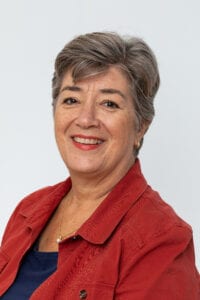
Today, access to the benefits of space is critical for all of us. This means that we all carry a responsibility for keeping it safe and secure. Establishing ‘rules of the road’ and norms of behaviour is essential, and work on ’Space Traffic Management’ is ongoing at various levels. It is an agenda item at COPUOS, States are issuing policy directives, industry associations publish white papers and guidelines, and recently the EU has taken an interest and funds two H2020 programs. It is essential for Europe to contribute to the development of what should ultimately become a global STM system.
Mr. Sven Kaltenhaeuser, Head of Department ATM Simulation, Institute of Flight Guidance, German Aerospace Center DLR, Germany

The continuing trend toward more and more launch and reentry operations and new spaceports poses a challenge for the efficient and safe integration of air and space traffic, globally but also on the European continent. Balancing commercial interests between the air and space domains in terms of their mutual operational interactions will play an increasingly important role. The transportation phase of STM must address these challenges and provide solutions in conjunction with ATM. New concepts for the use of higher airspace also play into these considerations. Various global approaches have to be combined into an interoperable solution that serves the needs of all airspace users.
Ms. Joanne Wheeler MBE, Managing Partner, Alden Legal, Chair of the Satellite Finance Network, UK

The dynamics of space are changing with:
(a) aspiring space nations joining the international space community;
(b) new categories of non-state actors: large industrial players; start-ups; and universities; and
(c) the advent of large constellations, cubesats and small launch facilities.
STM and sustainability are therefore increasingly important concepts and there is no substitute to a multi-stakeholder approach and a level playing field. The international community needs to cooperate and coordinate efforts to embrace these concepts and seek to apply them nationally. National regulators must take an anticipatory approach, while remaining competitive. An ecosystem of international guidelines, national implementation, effective launch and operations licensing and commercial “environmental, social and corporate governance” (ESG) linked to raising investment could be an important tool.
Dr. Mark A. Skinner, Senior Project Leader for Space Traffic Management, The Aerospace Corporation, USA
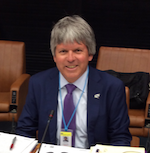
One trend in STM is the movement of monitoring and traffic coordination functions from defense-oriented agencies to civil and commercial-oriented agencies, which aligns with the growth of commercial space traffic, a desire on government’s part to encourage the national space economy and calls for increased transparency in space activities. A second major trend is that of replication of small, less expensive satellites, launched in large numbers. Standardization in the industry has led to significant cost savings, along with greatly lowered launch costs, allowing new entrants into space, with lowered barriers to entry. This new space activity has led to a need for additional oversight. Some aspects of the new regulatory regime can be handled by a smaller group of space-faring States, but there will also need to be a global approach, to lessen regulatory differences and a race to the bottom.
About the authors:

Dr. Olga Stelmakh-Drescher is a NewSpace advocate, international space lawyer and space environmentalist – shaper of the Space Sustainability Goals and social responsibility for space activities concepts. She holds the position of a Chief Policy and Government Relations Officer at Exolaunch, a global leader in rideshare launch services and deployment technologies for small satellites. Dr. Olga has an extensive background in space matters, having worked in the space sector for more than 15 years, including seven years of governmental and parliamentarian engagement.
Dr. Olga is a Board Member of the International Institute of Space Law, Member of the WEF Global Future Council on Space, Corresponding Member of the International Academy of Astronautics and the UNOOSA Space4Women Mentor. She places a lot of emphasis on leadership, knowledge-based society, inclusiveness and empowerment of the next generation, serves as mentor to many and is an often lecturer on issues of space sustainability and security, NewSpace and global space governance. Dr. Olga publishes extensively on space-related topics.

Prof. Steven Freeland is Emeritus Professor of International Law at Western Sydney University, specialising in Commercial Space Law, and previously the Dean of the School of Law. He also holds Visiting or Adjunct positions at various other Universities/Institutes in Copenhagen, Vienna, Toulouse, Hong Kong, Montreal, Kuala Lumpur, London and Queensland. Prior to becoming an academic, he had a 20-year career as an international commercial lawyer and an investment banker. He is a Member of the Advisory Group of the Australian Space Agency and has been an advisor to the Australian, New Zealand, Norwegian and several other Governments on issues relating to national space legislative frameworks and policy. He has represented the Australian Government at Committee on the Peaceful Uses of Outer Space (UNCOPUOS) meetings and has also been appointed by UNCOPUOS to co-chair multilateral discussions on the exploration, exploitation and utilisation of space resources, which will take place in April 2021. He is a Co-Principal of specialised space law firm Azimuth Advisory and is also a Director of the International Institute of Space Law, and a Member of the Space Law Committees of both the International Bar Association and International Law Association.



